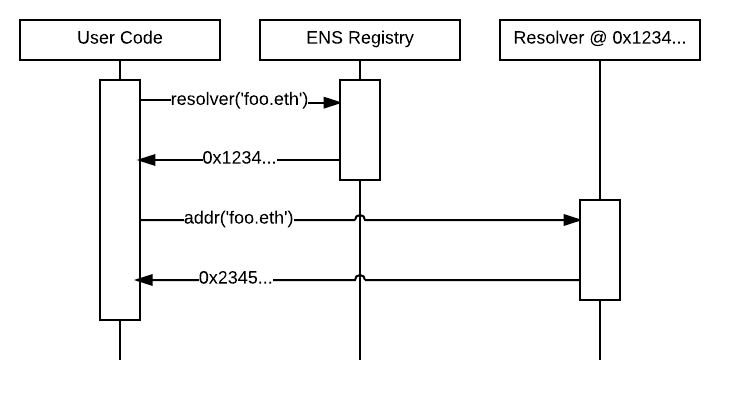Have you ever seen someone with an ".eth" Ethereum wallet address, rather than the regular long string of numbers and letters? Well that, my friend, is an ENS domain.
What Does ENS Stand For?
ENS stands for Ethereum Name Service.
What Are ENS Domains?
ENS is a protocol on the Ethereum blockchain, which shortens a long crypto address to a short, human-readable URL.
The new address is made up of a prefix and a suffix. The prefix can be anything you like! Be it your name, company brand, or just a goofy word — it’s up to you. The native suffix for ENS is “.eth”. However, they also support regular DNS suffixes such as .com, .org, and .xyz.
The domain is stored as a domain on the blockchain. This means that it must be minted by someone, which can then be traded on NFT marketplaces such as OpenSea.
When purchasing or minting a domain you’ll have to set a "registration period". This is essentially how long you’ll own the domain. Through the ENS app, this starts at 1 year and can go as high as you'd like.

What Can You Use Them For?
There are two primary reasons you would purchase an ENS domain.
The first, we've already discussed, is to replace your long crypto wallet address.
Alternatively, you can host decentralized websites using your ENS domain. Due to their decentralized nature, they will be "censorship-resistant".
If you're interested in how to do this, a developer at ENS, @makoto_inoue, released a Medium post to explain.
Once you own an ENS, you can also create subdomains. For example, if you own “hashnode.eth”, you could create the subdomain of “web3.hashnode.eth”. With this, you can either make subdomains for yourself or assign ownership to other people. You're free to do what you like with them.
Finally, as with a lot of things in the crypto space, it can be an investment vehicle. Those in the ENS community believe that these domains will play a huge role in the future of the internet. Therefore, they are purchasing premium domains to sell at a high price.
Are There Any Names I Can’t Use?
Not really, there are no limits on what can be registered. This includes foreign characters (e.g. ñ), symbols (e.g. ☺), and offensive terms. However, there is a character minimum (3) and maximum (255).
How Do ENS Domains Work?
ENS is built on two components: the registry, and the resolvers — these are two separate smart contracts.
The registry records all the registered domains; along with the owner of the domain, the resolver of the domain, and the caching time-to-live (how long until the domain will expire). It is the job of this component to keep a log of all ENS domains.
The resolver translates the domain names. This is either from the human-readable URL to the long string or the other way around. Anyone who enforces ENS standards can act as a resolver for the protocol. It’s this component’s job to pair the domain with its user.
Resolving an ENS domain takes two steps:
- Ask the registry for what resolver is responsible for the ENS domain.
- Ask the resolver for the address to resolve the domain and process the transaction.

Source: ENS documentation.
How Do I Buy an ENS Domain?
Head over to app.ens.domains, connect your wallet, and type in the domain name you want.
Next, select your registration period, and click the "Request to Register" button. You’ll then be asked to confirm your transaction.
Once that transaction is processed, you’ll have to wait roughly a minute for the "Register" button to be available. Click it, confirm the second transaction, and wait for it to be processed.
How Do I Set It as My Primary ENS Name?
You should see "Primary ENS Name (reverse record): not set". Click the drop-down menu, select your ENS name, then click “Save”.
If it says "Primary ENS Name (reverse record): [YOUR ENS NAME]", skip the previous step..
You now have purchased your ENS domain and made it your primary ENS name, meaning, it’llrepresent your wallet address. See the left of the ENS domain app screen for an example.
ENS Domains vs DNS Domains
How is all this different from traditional domain name system (DNS) domains?
DNS translates IP addresses into human-readable URLs. The key difference here is that ENS converts Ethereum addresses into human-readable URLs. They both play similar roles, just in different generations of the web.
In theory, DNS domains are less secure than ENS domains. This is due to DNS' centralized servers being an easier target for an attack, compared to the decentralized nature of ENS.
DNS domains are also subject to trademark law. Meaning that, if you owned Coinbase.com (before Coinbase owned it), the company could take legal action against you.
We are yet to see this enforced in the ENS space but, due to its design, it may be hard to enforce. This is because the domain owner could be anonymous and there is no centralized company that controls the domains. If you can't find the owner nor can you get a company to supersede them, how will you enforce trademark law?
This is a positive for investors but a negative for companies wanting to enter the space. There’ss a chance that investors can make big money off companies that want to create an ENS decentralized website or wallet address.
A Web3 Alternative to ENS Domains
There is one major ENS competitor — Unstoppable Domains
Unstoppable Domains
Unstoppable Domains are another crypto naming service. They offer suffixes such as .crypto, .nft, and .bitcoin.
Unlike ENS, there is no renewal fee. Once you purchase it, you own it for life. They also support multiple chains outside of Ethereum — such as the Cardano blockchain using the Yoroi wallet.
Also, they allow you to rename wallet addresses and host decentralized websites.
Unstoppable Domains vs ENS Domains
The major difference between the two is that ENS requires a registration period, whereas Unstoppable Domains let you own the address forever after a one-time payment.
Unstoppable Domains have also reserved some domains due to brand protection. On this topic, Unstoppable Domains has said, "To onboard the next 1 billion users into crypto, we need to onboard the existing internet community. Over the past 25 years, companies have invested huge resources to build brands online. We want these businesses to embrace and adopt blockchain domains."
This is not the case with ENS domains; you can buy any domain without the permission of ENS or any company.
When the Director of Ops at ENS, Brantly Millegan, was asked the difference between the two projects, he said, "ENS is an open, public protocol, developed by a non-profit with no investors, with EIPs and the support of the Ethereum Foundation, has more features, and has wide industry adoption. UD is a privatized copy with a corporate gatekeeper, fewer features (they just copy ENS), and far less adoption."
This article is a part of the Hashnode Web3 blog, where a team of curated writers are bringing out new resources to help you discover the universe of web3. Check us out for more on NFTs, DAOs, blockchains, and the decentralized future.

